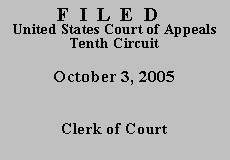 UNITED STATES COURT OF APPEALS
UNITED STATES COURT OF APPEALS
 UNITED STATES COURT OF APPEALS
UNITED STATES COURT OF APPEALS
| ORLANDO CORTEZ CLARK,
v. COLORADO DEPARTMENT OF COR-RECTIONS; DR. NWEKE, C.C.C.F. Medical; DR. FALLHOUSE, C.C.C.F. Medical; JOSEPH WERMER, Dr., A.V.C.F. Medical; CINDRA MAR-TINEZ, MRT II, A.V.C.F. Medical; ANTHONY DECESARO, CDOC Grievance Officer; DR. RAYMOND L. LILLY; DR. KENNETH D. DANYLCHUCK, |
|
Orlando Cortez Clark, a prisoner appearing pro se, brings suit pursuant to 42 U.S.C. § 1983. He argues that the Colorado Department of Corrections and its various employees violated his Eighth Amendment right to be free of cruel and unusual punishment. He contends that the defendants were deliberately indifferent to his medical needs. Exercising jurisdiction pursuant to 28 U.S.C. § 1291, we AFFIRM the judgments of the district court (1) dismissing Mr. Clark's suit for failure to exhaust his administrative remedies and (2) denying his motion to reconsider.
I. BACKGROUND
Mr. Clark is a prisoner in the custody of the Colorado Department of Corrections ("DOC") at the Arkansas Valley Correctional Facility in Crowley, Colorado. He initiated this action by filing a §1983 claim in which he alleged that the defendants were deliberately indifferent to his medical needs because (1) he was denied effective medication for severe back and leg pain for an extended period of time, and his necessary back surgery was improperly delayed; and (2) after his eventual surgery, he did not receive prescribed pain medication, orthopedic shoes, certain hose for his legs, a leg brace, or a medical pillow in a timely manner. The district court dismissed Mr. Clark's claims without prejudice because he failed to exhaust administrative remedies as to his first claim.
II. DISCUSSION
We review de novo a district court's dismissal of an inmate's suit for failure to exhaust administrative remedies. Jernigan v. Stuchell, 304 F.3d 1030, 1032 (10th Cir. 2002). The Prison Litigation Reform Act ("PLRA") states that "[n]o action shall be brought with respect to prison conditions under section 1983 of this title, or any other Federal law, by a prisoner confined in any jail, prison, or other correctional facility until such administrative remedies as are available are exhausted." 42 U.S.C. § 1997e(a); see also Porter v. Nussle, 534 U.S. 516, 524-25 (2002). In addition, we have held that "the PLRA contains a total exhaustion requirement, and . . . the presence of unexhausted claims in [a prisoner]'s complaint require[s] [a] district court to dismiss his action in its entirety without prejudice." Ross v. County of Bernalillo, 365 F.3d 1181, 1189 (10th Cir. 2004).
We agree with the district court that Mr. Clark appears to have exhausted administrative remedies as to his second claim of relief. Regarding his first claim, Mr. Clark asserted in the third stage of his formal grievance procedure that he was denied effective pain medication and that he needed surgery. However, he failed to make those allegations in the first two stages of the formal grievance procedure. The DOC Administrative Regulations do not allow an inmate to raise in a subsequent step an issue that was not raised in each prior step. See Colo. Dep't of Corr. Admin. Reg. 850-4(IV)(B)(3)(b) ("A substantive issue may not be added at a later step if it has not been contained in each previous step of that particular grievance."). Therefore, because Mr. Clark failed to exhaust his administrative remedies with respect to his first claim, the district court correctly dismissed his entire complaint without prejudice. See Ross, 365 F.3d at 1189.
Furthermore, we conclude that the district court did not abuse its discretion in denying Mr. Clark's motion to reconsider. See Elsken v. Network Multi-Family Sec. Corp., 49 F.3d 1470, 1476 (10th Cir. 1995) ("[W]e review a denial of a motion to reconsider only for an abuse of discretion."). Although we construe his pleadings liberally, see Haines v. Kerner, 404 U.S. 519, 520-21 (1972), Mr. Clark has neither alleged the existence of new law or evidence, nor made any convincing arguments that clear error exists or manifest injustice has been done. See Servants of Paraclete v. Does, 204 F.3d 1005, 1012 (10th Cir. 2000) ("Grounds warranting a motion to reconsider include (1) an intervening change in the controlling law, (2) new evidence previously unavailable, and (3) the need to correct clear error or prevent manifest injustice.").
III. CONCLUSION
For substantially the same reasons identified by the district court in its well-reasoned decision, we AFFIRM the dismissal of Mr. Clark's § 1983 claim, and we AFFIRM the district court's denial of his motion to reconsider. We GRANT Mr. Clark's renewed motion to proceed without prepayment of the appellate filing fee, and we remind him that he is obligated to continue making partial payments until the entire fee has been paid.
Entered for the Court
Robert H. Henry
Circuit Judge
*.This order and judgment is not binding precedent, except under the doctrines of law of the case, res judicata, and collateral estoppel. The court generally disfavors the citation of orders and judgments; nevertheless, an order and judgment may be cited under the terms and conditions of 10th Cir. R. 36.3.